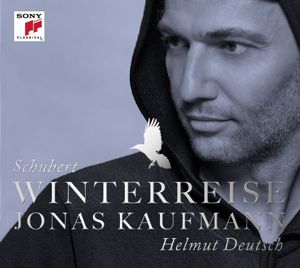|
|
|
|
|
|
|
|
|
The Star-Ledger, April 11, 2014 |
| Ronni Reich |
|
|
|
Winterreise |
|
 Jonas
Kaufmann has become the Metropolitan Opera’s go-to tenor for a wide variety
of leading roles, and has consistently lived up to his reputation. In the
more intimate realm of Schubert’s song cycle "Winterreise," however, his
artistry and the uniqueness of his dynamic sound are perhaps even more
striking than they are onstage — or when he records arias with orchestra. Jonas
Kaufmann has become the Metropolitan Opera’s go-to tenor for a wide variety
of leading roles, and has consistently lived up to his reputation. In the
more intimate realm of Schubert’s song cycle "Winterreise," however, his
artistry and the uniqueness of his dynamic sound are perhaps even more
striking than they are onstage — or when he records arias with orchestra.
Throughout the work, his voice takes on a viola-like quality — warm and
plangent. He is well suited to the story of a traveler in icy conditions who
has been burned by a failed love affair. The hooded character his tenor has
sometimes taken on in other performances and recordings seems to be gone.
There are times when he calls to mind a shout or a whisper, but he
constantly maintains beautifully supported singing and polished, deliberate
musicianship.
In the opening song "Gute Nacht," he shows that
although he can carry over a Wagner orchestra with stunning force, when he’s
at ease, the sound can be burnished and luxurious. Yet as soon as he
describes how his beloved’s mother once spoke of marriage, tension begins to
simmer. Hints of bitterness creep in as he harshens the delivery of a few
choice words, and pianist Helmut Deutsch matches his alternating sorrow and
anger, at first subdued and then building to a few dissonant, gnashing
moments. Regular recital partners, their rapport is strong.
In "Die
Wetterfahne," both evoke the gushing torrents of a windy snowfall, and
Kaufmann’s agility impresses. He is alternately plaintive and operatic in
"Erstarrung" as he sings of his dead heart, with her image frozen inside it.
The duo’s thoughtful phrasing evokes waves of the flood described in
"Wasserflut," as well as the tumble of tears falling into the snow. Kaufmann
lets out a powerful, animalistic cry as he describes his "burning woe."
By contrast, in "Frühlingstraum," he is playful, bright and cheery as he
sings of "gay birdsong." Then he jolts to alertness as he wakes from the
spring dream and shifts the color of his voice to match his description of
cold and darkness. Translations become almost unnecessary.
The
ever-sensitive Deutsch shows his virtuosic side in the swift rush of
"Rückblick," and in "Looking Back" in which Wilhelm Müller’s poetic text
describes the speaker’s breathless quest to get out of town immediately.
Kaufmann sounds wistful and a touch crazed as he sings of being deceived
and then becomes gentle as he slips into a pleasant memory. Wordy passages
are clear, and the images of thrown snowballs and hailstones land with
stabbing impact.
Kaufmann is hardy and robust as he sings of courage
towards the end of the cycle in "Mut!" But eventually, his animated
performance subsides to pale, ghostly intoning, nearly as devoid of
expression as his character is of will and spirit after a long journey. By
the time he reaches the final song, which illustrates the melancholy melody
of a hurdy-gurdy player, his defeat is poignantly clear.
|
|
|
|
|
|
|
|
|
|
|
|
|
|
|
|
|
|
|